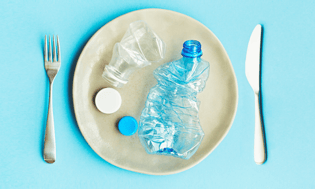 Globally, 322 million metric tons of plastics were produced in 2016. Exposure to some environmental conditions, such as heat, causes plastic to break into smaller fragments called microplastics, which can migrate into food.
Globally, 322 million metric tons of plastics were produced in 2016. Exposure to some environmental conditions, such as heat, causes plastic to break into smaller fragments called microplastics, which can migrate into food.
Single-use water bottles, to-go containers, food cans, and storage wraps are examples of common plastic-based food packaging that contains microplastics.
The microplastic chemicals present in food are a mixture of those that manufacturers deliberately add, such as fillers and stabilizers, and those that accumulate as byproducts, such as residues and impurities.
Below, we discuss some of the dangers of microplastics.
Disrupting hormones
Scientists consider at least 15 of the chemicals manufacturers use to make plastic packaging to be endocrine disruptors.
Endocrine disruptors are structurally similar to some hormones in the body — such as estrogen, testosterone, and insulin — and mimic and disrupt their natural functions, leading to adverse health effects and increasing a person’s risk of chronic conditions.
In particular, research has shown that exposure to BPA plays a role in infertility in males and females alike, as well as in the development of polycystic ovary syndrome
Increasing risk of chronic disease
Research continues to demonstrate that long-term exposure to endocrine-disrupting microplastics increases the risk of developing type 2 diabetes and heart disease.
Experts associate higher blood levels of dioxins, phthalates, and BPs with pre-disease states of inflammation, impaired fasting glucose, insulin resistance, and obesity, significantly elevating the likelihood of type 2 diabetes.
Some research suggests that exposure to these microplastics in food causes as much harm to a person’s health and raises their risk of chronic conditions to the same degree as following an unbalanced diet.
Impairing immune health
A 2020 review found that the increased inflammation induced by exposure to microplastics leads to poor gut health and, by extension, weakened immunity.
The gut plays an important role in immunity, with 70–80% of the body’s immune cells being in the gut. This means that any condition that affects gut health interferes with immune health as well.
Persistent exposure to microplastics in the gut is toxic to immune cells, causing dysbiosis — a disruption to the gut microbiota — and leading to an overgrowth of “bad” bacteria.
Research associates dysbiosis with the development of such conditions as Parkinson’s disease.
Moreover, the surface of microplastics may harbor harmful bacteria that further compromise immune health.

